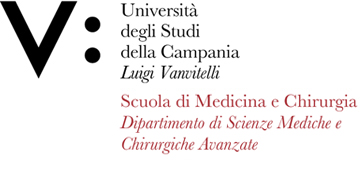Annamaria SPINA
Insegnamento di CHIMICA E PROPEDEUTICA BIOCHIMICA
Corso di laurea in TECNICHE DI LABORATORIO BIOMEDICO (ABILITANTE ALLA PROFESSIONE SANITARIA DI TECNICO DI LABORATORIO BIOMEDICO)
SSD: BIO/10
CFU: 4,00
ORE PER UNITÀ DIDATTICA: 40,00
Periodo di Erogazione: Primo Semestre
Italiano
| Lingua di insegnamento | ITALIANO |
| Contenuti | Il corso si propone di fornire allo studente le conoscenze teoriche e pratiche essenziali in chimica e propedeutica biochimica e gli strumenti necessari per gli studi successivi del corso di laurea. |
| Testi di riferimento | -Chimica Propedeutica alle Scienze Biomediche. Santaniello E., Coletta M., Malatesta F., Zanotti G., Marini S. Ed. Piccin. |
| Obiettivi formativi | - Comprensione delle leggi fondamentali che governano la materia e le sue trasformazioni. |
| Prerequisiti | Conoscenze di chimica necessarie per superare i test di ingresso alle Professioni Sanitarie Conoscenza degli elementi di base di matematica e calcolo. Lo studente che accede al corso di Chimica e Propedeutica Biochimica deve aver conseguito una preparazione di base in Chimica generale e organica. Al fine di uniformare le conoscenze di base saranno introdotti i concetti fondamentali prima di passare a quelli più complessi. |
| Metodologie didattiche | Lezioni frontali ed esercitazioni pratiche integrate. Le lezioni saranno suddivise in tre parti. Una breve introduzione per riprendere gli argomenti svolti nella lezione precedente, risposte a domande sugli argomenti svolti e presentazione nuovi argomenti. |
| Metodi di valutazione | La valutazione dello studente si basa sulla verifica dell’apprendimento sia della parte teorica che pratica. |
| Altre informazioni | Sarà condiviso in forma elettronica il materiale utilizzato per le lezioni frontali e le esercitazioni. |
| Programma del corso | LA MATERIA. Scopi ed importanza della chimica. Operazioni di misura e sistemi di misura. Le unità di misura nei calcoli. Precisione ed accuratezza di una misura. Volume, peso e densità. Stati di aggregazione della materia. Le leggi della chimica. La legge di conservazione della massa. |
English
| Teaching language | Italian |
| Contents | The course aims to provide the student with the essential theoretical and practical knowledge in chemistry and biochemical propaedeutics and the tools necessary for the subsequent studies of the degree course. |
| Textbook and course materials | -Chimica Propedeutica alle Scienze Biomediche. Santaniello E., Coletta M., Malatesta F., Zanotti G., Marini S. Ed. Piccin. |
| Course objectives | - Understanding of the fundamental laws that govern matter and its transformations. |
| Prerequisites | Knowledge of chemistry necessary to pass the entrance tests to the Health Professions. Knowledge of the basic elements of mathematics and calculus. The student who enters the course of Chemistry and Propaedeutics Biochemistry must have achieved a basic preparation in general and organic chemistry. In order to standardize basic knowledge, fundamental concepts will be introduced before moving on to more complex ones. |
| Teaching methods | Frontal lessons and integrated practical exercises. The lessons will be divided into three parts. A brief introduction to resume the topics developed in the previous lesson, answers to questions on the topics developed and presentation of new topics. |
| Evaluation methods | The student's assessment is based on verifying the learning of the theoretical and practical part. The oral exam will be preceded by inter-course written tests, based on calculation exercises. The inter-course written tests are only a verification of classroom learning and aim to assess the student's ability to apply the laws of general chemistry, the reaction mechanisms of organic chemistry and the basic knowledge of general and organic chemistry theory. The inter-course written tests include questions and calculation exercises concerning the fundamental aspects of general and organic chemistry, as well as the main aspects of the concept of the mole, stochiometry calculation properties of the solutions with particular regard to the methods for expressing the concentration, characteristics of the aqueous solutions of electrolytes, colligative properties, official nomenclature of organic and inorganic chemical compounds, acid-base reactions, structure, properties and reaction mechanisms of the most important classes of organic compounds, with special details on those of biological interest. The oral exam covers all aspects of Chemistry and Biochemistry Propaedeutics programm. The student must be able to discuss the topic and demonstrate the ability to link the knowledge acquired. The final mark is expressed in 30/30. |
| Other information | The material used for the lectures and exercises will be shared electronically. |
| Course Syllabus | MATTER. Aims and importance of chemistry. Measurement operations and measurement systems. The units of measurement in the calculations. Precision and accuracy of a measurement. Volume, weight and density. States of aggregation of matter. The laws of chemistry. The law of conservation of mass. |








